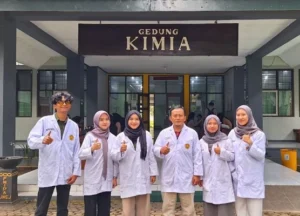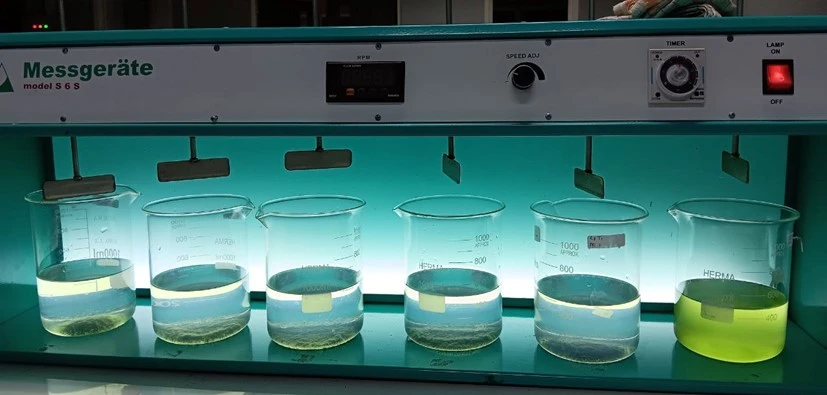 The Student Creativity Program Team for Exact Research (PKM-RE) Faculty of Mathematics and Natural Sciences, Jember University presented an innovative solution to overcome the problem of microalgae waste. The team headed by Imelda Dwi Puspita from the Chemistry Department consisted of Muhammad Ragil Ainur Rahman, Ka’aziyah Aulia Nada, and Sya’rifa Salma Musliyati Putri from the Chemistry Department and Silfia Ayuni from the Biology Department. This team is guided by chemistry and environmental lecturer Dr. Bambang Piluharto, S.Si., M.Si. from the Chemistry Department, FMIPA UNEJ and passed the 2024 PKM 8 Sector funding stage. This research is entitled “Flokulasi Mikroalga Menggunakan Kitosan Magnetik serta Uji Potensinya sebagai Pupuk N dan P”.
The Student Creativity Program Team for Exact Research (PKM-RE) Faculty of Mathematics and Natural Sciences, Jember University presented an innovative solution to overcome the problem of microalgae waste. The team headed by Imelda Dwi Puspita from the Chemistry Department consisted of Muhammad Ragil Ainur Rahman, Ka’aziyah Aulia Nada, and Sya’rifa Salma Musliyati Putri from the Chemistry Department and Silfia Ayuni from the Biology Department. This team is guided by chemistry and environmental lecturer Dr. Bambang Piluharto, S.Si., M.Si. from the Chemistry Department, FMIPA UNEJ and passed the 2024 PKM 8 Sector funding stage. This research is entitled “Flokulasi Mikroalga Menggunakan Kitosan Magnetik serta Uji Potensinya sebagai Pupuk N dan P”.
Microalgae are photosynthetic aerobic organisms that grow widely in shrimp ponds. These organisms can become agents of water pollution if not managed properly. “Microalgae contain high nutrients but can cause eutrophication and disrupt the balance of the pond ecosystem,” said Imeda. Apart from microalgae, shrimp ponds also produce other waste in the form of shrimp shells. The abundance of shrimp ponds also increases the amount of shrimp shell waste produced, so creative innovation is needed to maintain ecosystem balance.
The research by the PKM-RE FMIPA UNEJ team focuses on the use of magnetic chitosan synthesized from shrimp shell waste and modified by adding magnetic particles in the form of Fe3O4. The magnetic chitosan is then used as a flocculant to bind microalgal waste. The development of chitosan into magnetic chitosan as a flocculant is very unique and profitable because the flocculation results are easily separated with a magnet, so that the flocculation and microalgae separation processes become more efficient.
“So far, shrimp shell waste has been thrown away, even though it has great potential to be processed into magnetic chitosan,” explained Imelda, head of the PKM-RE FMIPA UNEJ team. “The results of flocculation of microalgae waste with magnetic chitosan also have potential as N and P fertilizer, which is beneficial for plants.” Imelda explained the research her team has been carrying out since April 22, 2024, at the Chemistry Department Laboratory, FMIPA UNEJ. Research not only provides environmentally friendly solutions to deal with microalgal waste but also produces products of high economic value.
It is hoped that magnetic chitosan and the results of the N and P fertilizer potential test can help shrimp farmers improve pond water quality, increase crop yields, and further develop N and P fertilizers for agriculture. The PKM-RE Team, FMIPA UNEJ, hopes that this research can encourage the application of environmentally friendly technology in processing shrimp shell waste and dealing with microalgae waste in Indonesia.

